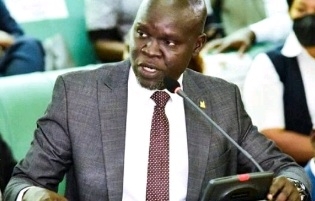By Eumu Emmauel
Members of Parliament have urged the government to replace the current recruitment system in local governments with a digital platform to combat the rampant corruption and bribery allegations plaguing district and city service commissions.
“The Ministry of Public Service should implement e-recruitment processes across all local governments,” said Hon. Martin Ojara Mapenduzi, the chairperson of the Committee on Public Service and Local Government. “This will limit physical interactions between job applicants and commission members.”
Mapenduzi highlighted the committee’s findings of widespread corruption and bribery within the service commissions during oversight visits to various local governments. He noted that these issues have severely eroded public confidence in the recruitment process.
“For instance, in Kikuube District, we discovered that over Shs.2 trillion earmarked for recruitment in the 2021/2022 financial year was not utilized. The district lacked a functional district service commission at the time and attempted to hire the services of the Kibaale District Service Commission, but the recruitment process was suspended due to bribery allegations,” he explained.
Mapenduzi shared these insights while presenting the report of the Committee on Public Service and Local Government regarding the functionality of District Service Commissions (DSCs) and City Service Commissions (CSCs) in personnel management across the Northern, Western, and Eastern regions. The presentation took place during a House sitting on Friday, 30 August 2024, chaired by Deputy Speaker Thomas Tayebwa.
He also recounted how the committee interacted with aggrieved individuals who were unfairly eliminated from job contests due to bribery. “During a radio talk show on Voice of Lango, a caller alleged that the service commission demanded Shs.5 million to secure a job,” he added.
The committee’s report cites political interference in the recruitment process, in violation of the Local Government Act, which mandates the independence of the commissions. In some local governments, recruitment processes were halted by the Inspector General of Government (IGG) due to irregularities, negatively impacting service delivery. MPs urged the IGG to expedite investigations into such cases and establish timelines for their resolution.
Mapenduzi also highlighted the challenges surrounding the pension scheme, which he described as riddled with discriminatory and delayed payments. “Pension management is problematic, partly due to data migration issues during the transition to the Human Capital Management System, leading to delayed payments and pension arrears,” he said.
There were additional complaints that some pensioners were receiving payments not aligned with their salary scales. The committee called for a robust review of the pension system.
Deputy Speaker Tayebwa acknowledged the critical issues raised in the report and deferred the debate to a later date. “This is a critical report with implications for the entire country. The issues concerning service commissions are too significant to rush through. We will discuss the report when Parliament reconvenes,” Tayebwa stated.


